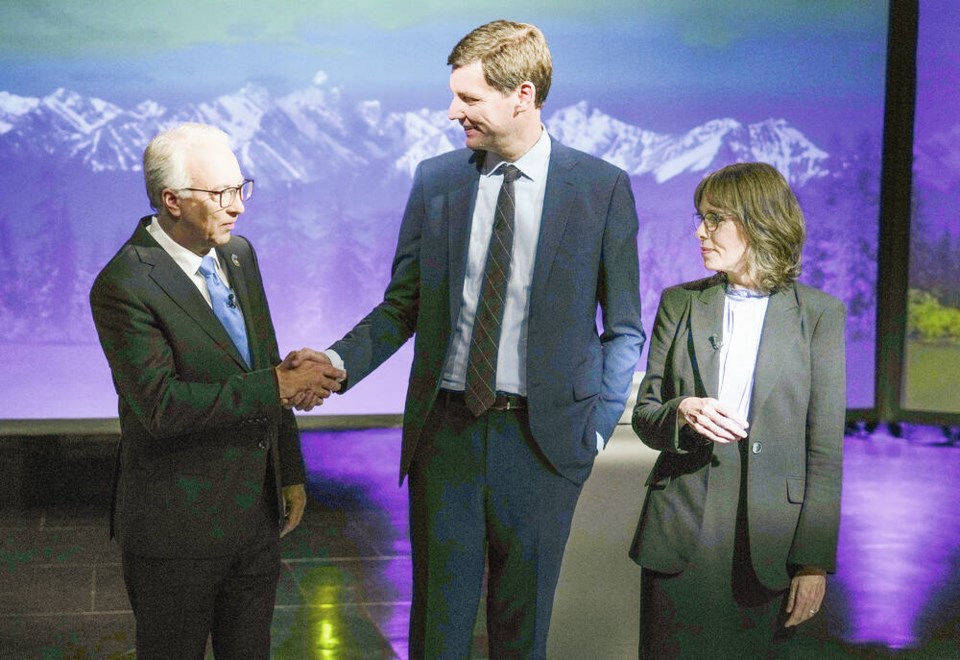Although the leaders’ debate was dominated by depressing, expensive social problems, some of the tax talk sounded encouraging.
Attention returned Wednesday to differences between two major tax-cut promises from the B.C. NDP and the Conservative Party of B.C.
They both look promising, but that’s all they are at this point: promises. A similar NDP rebate plan from seven years ago for renters lay dormant for years and arrived in a watered-down version.
B.C. Green Party Leader Sonia Furstenau stands alone in opposing tax cuts, saying during the debate that generations of politicians promise them when the revenue should be used to solve problems systematically.
Conservative Party of B.C. Leader John Rustad opened the bidding earlier in the campaign with a promise to make up to $3,000 a month in rent or mortgage payments tax-deductible.
Reducing taxable income to that extent would save middle-income earners about $1,600 a year in taxes, he said, although it would take a year to start implementing and require several years before it takes full effect.
The full impact of the tax can’t be determined until the party’s platform is rolled out in coming days. NDP Leader David Eby quoted an economist who called it “pixie dust” and said the full benefit wouldn’t arrive until 2029.
But it was enough to prompt him to match it.
He said Wednesday the NDP version would arrive sooner than the Conservative one and benefit more people.
The “Rustad Rebate” would go to owners and renters, but Eby said the NDP income tax cut would benefit every adult in every household.
A multi-generational family of four adults would get double what the Conservative plan would save them, he said.
People sharing accommodation and not listed as owners or renters would not enjoy the Conservative plan, he said.
“If you’re working and you’re living with your parents … you don’t benefit at all from his plan.”
Eby said Â鶹´«Ã½Ó³»penthouse owners are the main beneficiaries.
The Green platform promises big tax hikes on polluters and high-income earners. Furstenau said she wants to “make sure we’re capturing that wealth and taxing it properly.”
Referring to housing, Furstenau said: “If we were concerned about that enormous accumulation of wealth … about the growing inequality and growing poverty, we would be looking at ways to actually tax some of that wealth.”
“I want us to make sure that in B.C. we don’t have Lamborghinis driving down a road where people are living on the streets.”
Green tax policy includes an 18 per cent tax on profits over $1 billion, a 12.5 per cent tax on incomes over $350,000 and more increases on homes over $3 million.
Eby and Rustad are close to being on the same page about another tax cut — the elimination of the carbon tax on consumers. Conservatives were the first to advocate total elimination, and Eby abruptly announced two weeks before the campaign started that he would abandon part of it if federal law changes.
He was positioning for a federal Conservative win in the next year, since they would abolish the carbon tax.
Eby said then that people are struggling with affordability and “the political consensus we had in B.C. has been badly damaged by the approach of the federal government.”
“So if it decides to remove the legal backstop requiring us to have a consumer carbon tax, we will end the consumer carbon tax in B.C.”
Eby’s affordability rationale is undercut by the fact there are carbon tax rebates that offset the tax for many people. The unpleasant prospect of defending the B.C.-born carbon tax through the election campaign had a lot more to do with his decision.
So, although they are shaped differently, voters can look forward to two noticeable tax cuts, regardless of which party wins the election.
The impact on government revenues will take a lot longer to figure out. Both new governments would dig themselves much deeper in the red by implementing them. Each income-tax cut would cost in the nine-figure range. The carbon tax generates $2.6 billion, but most of that comes from industry, as opposed to consumers.
With the current annual operating deficit at $9 billion, B.C. will be running deficits for years to come, regardless of who wins.
But the leaders are much more focused on moving public opinion in the next 10 days than they are on accounting over the long haul.
>>> To comment on this article, write a letter to the editor: [email protected]



.jpg;w=120;h=80;mode=crop)